- Home
- William Kennedy
Very Old Bones Page 10
Very Old Bones Read online
Page 10
Again the doorbell sounded and I placed myself in the angular hallway that ran from front door to back parlor, hiding behind wicker filigree decked with clusters of china, people in breeches and wigs and hoopskirts, and dogs and cats with flat bottoms, and then I saw a man with a happy and perfectly round face beneath a bald dome take a cigar out of his mouth and say to Peter, “I got your mother here.”
And Peter said, “Bring her in, she’s welcome,” and from the smiles that followed this exchange and from all the smiles and music and ongoing electrification, I would take home from this day my first impression of death: that it was an occasion for music, levity, light, and love.
“How’ve you been, Ben?” Peter asked.
“If I was any better,” said Ben, looking for a place to rid himself of the half-inch ash on his cigar, “I’d call the doctor to find out what ailed me.”
“In the window,” Peter said. And Ben swung his portly self toward the street and motioned to the four men standing at the back end of the hearse, and home came Kathryn Phelan, her last visitation in the flesh. Just ahead of her came another man with the catafalque, a four-wheeled accordionesque platform which stretched to meet the space, and upon which Kathryn and her mahogany coffin came to rest, the coffin’s closed cover gleaming in the sunlight (no electricity yet).
The onlookers now included Ben Owens, Molly, Sarah, Peter, me, and the electrician, who was on a ladder in the middle of the room installing the Claire chandelier, and who said, “Do you want this thing workin’ tonight?” and Peter said, “We do,” and the electrician said, “Well, then, I ain’t movin’ off a here,” and Peter said, “There’s no reason you should. Make yourself at home up there,” and so they moved the coffin around his ladder and the advent of the light proceeded as planned.
The family then retreated to the back parlor as Peter closed the sliding doors between the two parlors and waved a go-ahead sign to Ben Owens. And then the tableau that I would carry with me created itself: Peter sitting at the piano, Sarah standing by the kitchen door off the back parlor with folded arms, Molly settling into the armless horsehair ladies’ chair beside the piano and staring at Peter as he pumped up the music. I, sensing tension and trying desperately to make myself disappear, retreated to a far corner of the back parlor where I could observe the expanse of tradition and sibling relationships manifested in objects and body postures, and listen to love manifested in music, and perceive, I knew not how, the ineffable element that seeped under the closed parlor doors when the coffin was opened; all this fixing forever in me the image of life extended beyond death, and fixing too the precise moment of the advent of the light.
The electricity would insinuate itself from the power line on the outside pole, through the front wall, across the ceiling, and into the chandelier at the electrician’s touch, and the onset of the light would startle Ben Owens so that the comb he was using to touch up Kathryn Phelan’s hair would fly out of his hand and into a shadowy area behind the coffin, and Ben would say, “Cripes, what was that?”
And light would seep under the sliding doors to be greeted by Peter’s remark: “It’s here,” and the apple-tree song would end as light began.
The sliding doors would open onto the new tableau of undertaker, electrician, siblings, and myself, all of us staring at the corpse that was so regally resplendent in high-necked magenta burial gown and pink-taffeta-lined coffin, and Mame Bayly’s flowers would give sweet fragrance to Kathryn Phelan’s final performance—her first under the bright lights—on this very old stage.
Chick Phelan took a half-day off from his job as a linotypist in the Times-Union’s composing room for this first night of the wake, the night the family and a few select friends would have the corpse all to themselves. He brought home four bottles of Schenley’s whiskey and a box of White Owl cigars for the wakegoers, and announced his partial list of bearers for the funeral: the McIlhenny brothers, Dave and Gerry, nephews of Kathryn recently off the boat from County Monaghan; Martin Daugherty, Barney Dillon from across the street, and two more to be recruited at the wake.
Food began to arrive. Betty Simmons sent her teenage son over with a turkey and stuffing; the Ryan sisters baked a ham and made their famous potato salad and delivered it themselves but didn’t come in, would wait for the wake’s second night, when friends called. Flowers came: six baskets at once, one from George and Peg Quinn and family, plus the pillow of red roses from the Phelan children, with the word “Mama” in gold letters on a ribbon. When the deliveryman handed Peter the last basket of flowers and went back down the stoop to his truck, a figure came limping across the street and stood at the bottom step, hands in pockets, fedora at a rakish tilt, clothes old and grimed, and this man looked upward into Peter’s eyes.
“I’ll be a son of a bitch,” Peter said.
“Ya always have been,” the man said with a small smile.
Peter put the flowers aside and extended his hand. “Come on in,” he said, and the man came up the three steps, wiped the soles of his shoes on the doormat, and stepped inside, gripping Peter in a strong handshake. Peter closed the door, holding the man’s shoulder, and walked him down the hallway to the back parlor where Molly was giving a last-minute dusting to the furniture.
“Say hello to your brother, Moll,” Peter said, and she turned and looked and gaped and dropped the feather duster, and then ran four steps and threw her arms around the man and said “Fran,” and looked at him again and cried and kissed him and cried some more. “Fran, Fran. We thought you were dead.”
“Maybe I am,” Francis Phelan said.
He looked toward the front parlor and saw the corpse of his mother in her final silence. He stared at her.
“Go on in,” Molly said. “Go in and see her.”
“I’ll get to it,” Francis said, and he continued to stare.
“I’ll tell the others you’re here,” Molly said and she went toward the back stairs.
“How’d you find out?” Peter asked.
Francis broke his stare and looked at Peter. “I was in a lunchroom down in Hudson. Been stayin’ down there all fall, pickin’ apples, fixin’ up trucks for the owner, and this fella next to me gets up and leaves the Albany newspaper. I never do read a damn newspaper, but I pick this one up and turn the page and there’s the obit. I look at it and I figure right off this fella left that paper so’s I could see that, and I say to myself, Francis; maybe it’s time to go back and see people, and I took the next train that come by.”
Francis turned back toward the coffin and Peter read the look on his face: The bitch is dead . . . lower away. Francis’s honesty in the teeth of unpleasant truth was galling to Peter; always had been. Hypocrisy is a sometime virtue, but then again fraudulence can stifle, even smother. Hadn’t Peter’s stifling of his own anger cost him years of bondage to this woman, this house?
“What’s goin’ through your head?” Peter asked.
“I was just thinkin’ how much she missed by bein’ the way she was,” Francis said. “She didn’t really know nothin’ about how to live.”
“Of course you’re the expert on that,” Peter said. “You’re a walking example.”
Francis nodded, looked down at his ragged attire, his shoes with even the uppers falling apart.
“Ain’t sayin’ I ever figured out how it was done, but I still know more’n she did. I got nothin’ against her anymore. She done what she hadda do all her life, and somethin’ gotta be said for that. I just never bought it, and neither did you.”
“Things got better when I moved to New York,” Peter said.
“That’s what I mean,” Francis said. He looked again at his mother, nodded once, that’s that, then turned his back to her.
Molly came in carrying two of the six flower baskets from the front hall. She set them on the floor near the head of the coffin.
“Everybody’ll be right down,” Molly said.
“Who’s everybody?” said Francis.
“Sarah and Tommy and Chic
k. They’re all home. Tommy’s a bit confused.”
“That figures,” said Francis.
Francis saw me edge into the room and sit in an empty chair. “Who’s the kid?” he asked.
“That’s the boy,” said Peter. “I mean the son of my landlady. Orson, say hello to a brother of mine, Francis.”
“How do you do, sir,” I said.
“I don’t know how I do sometimes, kid. Nice t’ meet ya.” And Francis shook my hand. He looked at his own hands then. “Can I wash up a bit?” he said, and he rubbed his palms together. “Kitchen’d be fine. Still where it used to be?”
“Go upstairs, use the bathroom,” Molly said.
“No need,” said Francis, and he moved to the kitchen, shoved his coat sleeves upward and soaped his hands with a bar of tan common soap. Molly watched him from the kitchen doorway, handed him a towel.
“Have you had lunch?” she asked.
“ ’bout a week ago,” Francis said.
“I’ll set the table,” she said. “There’s cold chicken, and Sarah’s biscuits.”
“Sounds mighty good,” Francis said.
He walked to the dining room to take his old place, his back to the famous china closet, facing the window on the yard where Katrina’s house had stood before it burned. Now only tall brown stickweeds inhabited the vacant lot where the house had been.
“You’re limping,” Molly said.
“Bumped my leg a few days ago, but it’s gettin’ better.”
“Let me look at it.”
“Nah, it’s fine. Nothin’ to see, just a black-and-blue mark.”
But the leg was more than black and blue. It was a massive infection whose pain had grown, subsided, grown again. Francis had bathed and bandaged it when he could, but the last bandage had come off during his climb onto the train up from Hudson, and he threw the soiled cloth out the freight-car door after he’d settled in. The wound was a legacy from being hit with a club by a flophouse bouncer, and what seemed like a trivial gash turned into an ulceration six inches in length with a purplish center, a gouge from which pus oozed, scaly white skin flaked and peeled, and flesh vanished. Francis now saw the wound as an insurance policy against life. When times got worse, as they seemed to be doing, he would cultivate the pus, the pain, the purplish-white crust of poison. What’s a little pain when it leads to the significant exit?
He heard steps on the back stairs, turned to see the feet of his brother Tommy, unmistakable canal boats in soiled white work socks, and behind him brother Chick, wearing galluses on a collarless shirt, a mile-wide smile on his face as he ogled Francis from midstairs.
“Hey, you old bastard,” Chick said. “How you doin’?” Chick came down the final two steps, pushed Tommy aside, grabbed Francis’s hand, threw an arm around his shoulder, slapped his back. “You old bastard,” Chick said. “Where you been?”
“How you, old Chickie pie? You’re fat as a pregged-up porker.”
“I can’t believe this, Francis, I can’t believe it. We give up on you years ago. Never thought I’d see your mug in this house again.”
“I thought the same thing.”
“Franny? Franny?” Tommy stood at Francis’s elbow, squinting, focusing. “Franny?”
“Tommy. Howsa boy? Eh? Howsa boy, old Tom-Tom?”
“Franny?”
“It’s me, Tom. It’s me. You remember me?”
“Sure I remember, Franny. How’s things, Franny?”
“Things is like they are, Tom boy.” Francis stood and wrapped his arms around Tommy’s shoulders, then kissed him on the cheek. “You old horse’s ass.”
Tommy smiled.
“Horse’s ass. Franny. You shouldn’t call me a horse’s ass.”
“Why not?” Francis said. “Where’d a horse be without his ass? Think about it.”
“Horse’s ass,” said Tommy in a whisper to Molly “Franny called me a horse’s ass.”
Francis parted Tommy’s right cheek and the room glowed with laughter, and the generosity of abuse.
Peter Phelan looked at his brother and saw himself as he wished he’d been but could never be. He saw a man who pursued his own direction freely, even if it led to the gutter and the grave. Francis was a wreck of a man, a lost soul on a dead-end street, yet in him was no deference to the awful finality of his condition. He did not seem to notice it. Nor did he defer to anything else, not the dead mother, or the need to spruce up for the family, or Tommy’s softness. And not Peter. Especially not Peter.
“So what’s with you, Fran?” Chick asked. “You gonna hang around or are you gonna disappear again?”
“Couldn’t quite say,” Francis said. “Just came to see the family.”
“Will you see Annie and the children?” Molly asked. “Peg sent flowers, you know. I’m sure she and George and Annie will be coming.”
“Don’t know about that,” Francis said. “Don’t know what tomorrow’ll bring. If I’m here and they come I guess I’ll see them.”
Francis had been gone from Albany since 1916, a fugitive from wife and children after his infant son, Gerald, fell and died while Francis was changing his diaper. But Francis had been gone from this family long before that: from the early days of his marriage to Annie Farrell. No, even before that.
Peter watched Francis chew a chicken leg, saw the lineaments of face, the geometry of gesture that had not significantly changed since childhood. The way he wiped his mouth with his knuckle was the same as when he’d sat in that seat and eaten cold chicken fifty years ago. Nobody ever changes: a truth Peter had embraced with reluctance. Did anybody really progress, or was it illusory? (Wasn’t the illusion of change another opiate of believers? Carrot and stick, keep ’em movin’.) Certainly it was illusory in art. After twenty-one years Peter has a one-man show whose meaning he fails to comprehend. Perhaps, he concedes, it has no meaning, and I’ll always be viewed as a pygmy among men.
But he can claim credit for having brought the light to Colonie Street. Top that, brother. There is serious merit in bringing the light. The better to see you with, mon frère. Peter: the voyeur still, where Francis is concerned; and then Peter called up Francis’s last days as an intimate member of this household. That was in ’98, and Francis was eighteen. They were at the table, Mama and all the children sitting then where they are now (Mama’s chair empty now), Sarah then sitting where Papa had sat, for she had become Little Mother, that status her legacy from Papa, who, on his deathbed after the train accident in ’95, grasped her hand and said to all in the room, “I don’t care who gets married as long as Sarah stays home with her mother.” Sarah was twelve then. And hadn’t she done admirably well what her father asked in the thirty-nine years since his death? Oh hadn’t she?
They were finishing supper that night in ’98 when Francis carried his plate to the kitchen and announced that he had to go over and work for Mrs. Daugherty, painting all her interior doors, windows, woodwork, two weeks of evening work at least. Francis then went out the back door and over the fence into the Daugherty back yard. Peter remembered the look on his face as he went: nothing betrayed, no hint that he was off on another mortally sinful expedition into the house of lust.
Lust thrives in the summertime. “Outdoor fucking weather,” is how Peter heard Francis phrase it one day in front of Lenahan’s grocery with half a dozen other boys, all Peter’s elders. Peter did not think Francis had ever experienced any full-scale fucking, outdoors or in. Francis wouldn’t risk that, Peter reasoned, wouldn’t chance the damnation of his immortal soul for all eternity for the sake of “getting his end wet,” another indelible phrase out of Francis. But Peter had gone through his childhood underestimating Francis, misjudging what he would and wouldn’t do. Also Peter perceived in Katrina Daugherty a sensual streak possessed by no other woman he had ever known, loved her face and her hair and her body (body so perfectly designed with the proper arcs and upheavals, body he tried to imagine naked so he could draw it and possess its replica long before he’d ever given a
thought to a career as an artist).
And so he waited until summer darkness enveloped Colonie Street, then left the baseball field, where after-supper sport was winding down, and fled across gulley and yard to the apple tree whose upper branches gave sanctuary and vantage to a voyeur seeking to verify the secrets of life and lust among the Daughertys. He had once watched Katrina and her husband, who were unaware that the trees had eyes, half disrobe each other, then walk all but naked up the stairs and out of his sight.
For the past three nights he had watched Katrina alone, or Katrina following Francis around the house, sitting by him while he painted, talking, always talking, never touching or kissing or disrobing, nothing; in sum, that would hold truly serious interest for a spy. But his reading of Francis—that this formidable brother would not be spending his nights painting if all that it availed him was money; that he had to have another motive to keep him from the baseball games that went on three blocks away every night of the summer that was not ruined by rain—kept the spy twined among the branches of the apple tree, waiting for the inevitable.
When it came Peter was not expecting its suddenness, even less so what came with it. His eye found Francis on a ladder, painting the window molding in an upstairs bedroom, saw Katrina’s silhouette in the next room, visible through translucent curtains and moving with a purpose he could not define, saw her then with full clarity when she entered the room where Francis was, this room curtainless to receive the new paint.
Peter was close enough to throw an apple and hit Francis on the ladder, yet was certain he was concealed by the lush leafing of the tree, certain also that on this moonless night his profound purpose was served: the cultivation of an internal excitement like nothing he had ever known. The excitement came not only when he saw Francis and Katrina together (even if they only talked), but more so when she was wandering through the house and talking to herself, or reading a book as she walked, which, irrationally, excited him most: knowing she was oblivious of him and even of her present moment, seeing her transported as much by a book as he was by her solitary grace.

 Riding the Yellow Trolley Car: Selected Nonfiction
Riding the Yellow Trolley Car: Selected Nonfiction Changó's Beads and Two-Tone Shoes
Changó's Beads and Two-Tone Shoes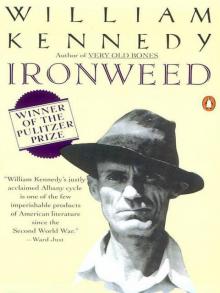 Ironweed
Ironweed The Ink Truck
The Ink Truck Billy Phelan's Greatest Game
Billy Phelan's Greatest Game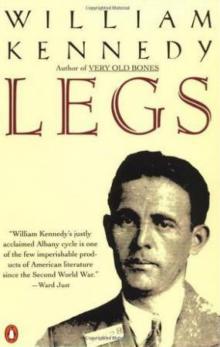 Legs
Legs Very Old Bones
Very Old Bones The Last Mission
The Last Mission The Flaming Corsage
The Flaming Corsage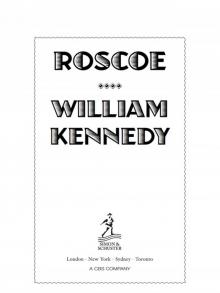 Roscoe
Roscoe Quinn's Book
Quinn's Book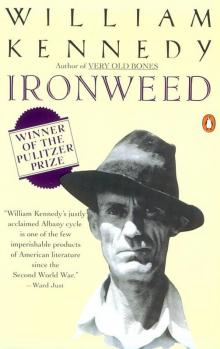 Ironweed (1984 Pulitzer Prize)
Ironweed (1984 Pulitzer Prize) Riding the Yellow Trolley Car
Riding the Yellow Trolley Car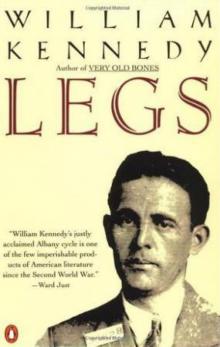 Legs - William Kennedy
Legs - William Kennedy